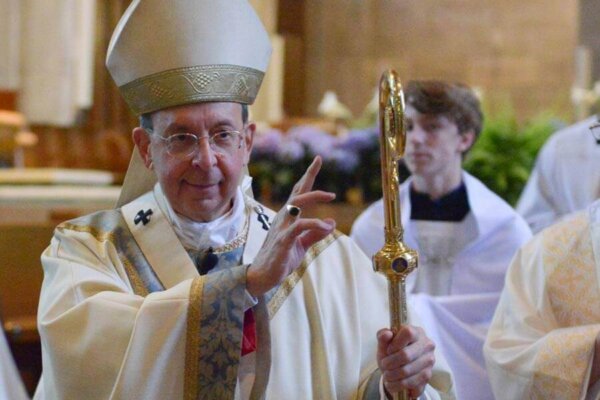Friday 6th Week
Knights of Columbus Board Meeting, New York City
February 21, 2025
The Wrong Project for the Wrong Reasons
Things didn’t go well for the city planners and builders at Babel. They had plans to build a great city for themselves and in honor of themselves. Indeed, their project was well underway when disaster struck. God, in effect, cancelled it by confusing their language. Suddenly architects and builders could no longer understand one another, making it impossible for them to continue. Buildings half-finished were abandoned as they dispersed to the four winds.
I’ve often wondered about that story. The centerpiece of their city was to be a tower that would pierce the clouds. But to what height could a tower built of brick rise? Put another way, they weren’t exactly constructing the Chrysler Building. So why would an omnipotent God care about such an insignificant project? And why did God confuse their language? He must have known that people speaking different languages eventually would figure out how to communicate with one another. God may even have foreseen Berlitz if not Google Translate. What, then, is the point of the story?
Perhaps it is this. They built so as to make a name for themselves. Their buildings of brick and mortar were a way of building their egos, a way of ensuring they would go down in history. They also undertook their project to assert their independence from God and even to express their mistrust of God. Their city was to be a bulwark that would prevent God from scattering them. It was the wrong project undertaken for wrong reasons.
A Story about Ourselves
Let me apply this story to my own life. A few years ago, a new Catholic school was built in Baltimore. It had been decades since a new Catholic school was built in the City. What’s more, this beautiful new structure was to serve deserving young people from disadvantaged neighborhoods. On the day of its dedication, someone said to me, “Archbishop, this new school is a monument to your leadership.” For a moment I believed her. I preened my feathers, or what’s left of them. But alone with the Lord, I knew better. If that school wasn’t for the Lord and for the kids, it was nothing but a pile of bricks. “Unless the Lord build the house, they labor in vain who build it” (Ps 127).
How easily we can think like the people of Babel. The homes we build, the careers we construct, the reputations we fabricate – we can see these things as monuments to ourselves or even as the central project of our lives. When we are absorbed with constructing our own greatness, God becomes a competitor, and his will, an impediment to our plans. We thus lose the ability to communicate with God and with others – not only our colleagues but even our loved ones. When one’s career or any other project becomes the be all and end all, there will be miscommunication because the language of love is no longer spoken.
The True Project of Our Lives
To discover the true project of our life, let us turn from Babel and towards the Gospel, where Jesus says to us, “Whoever wishes to come after me must deny himself, take up his cross, and follow me.” And again: “Whoever wishes to save his life will lose it, but whoever loses his life for my sake and that of the Gospel will save it.” And yet again: “What profit is there for one to gain the whole world and forfeit his life?”
If we really took to heart what the Lord is saying, we’d be gasping! The denial of self he is calling us to is not superficial but radical. Jesus is talking about ‘a total shift of the center of gravity in our lives, an abandonment of self that entails letting go of our attachments and agendas, even to the point of letting go of our very lives’ (Cf. Mary Healy, Mark, p. 169). And while this may sound exceedingly grim to secular ears, for us who are the Lord’s disciples and friends, it should sound like a loving invitation to trade in our tattered plans of self-fulfillment in exchange for God’s plan. Simply put: It is God’s plan that we attain the fullness of life by sharing his Son’s death. Taking up our cross, we are relieved of the burden of our sins and the burden of striving in vain to manufacture our own greatness.
What, then, is our true project and purpose? Isn’t it to let the biblical plan of redemption be realized in our lives? The plan of the God who so loved the world that he sent his Son to save it! The plan of the Savior who loves me and gave his life for me! This is the very heart, the core, of every saint’s life story! This what Baptism demands of us! As St. Teresa of the Child Jesus famously said, “If I am not becoming a saint, I am doing nothing.”
Building as Fr. McGivney Built
No K of C homily would be complete without reference to Bl. Michael McGivney. So let us recall how he founded and built the Knights of Columbus: not to make a name for himself but to glorify the Lord and to serve his people. That is why what he built still flourishes. That is why he is in heaven. That is why we must strive to build as he built – with tools of charity, unity, fraternity and patriotism – all of them flowing from the Cross of Jesus Christ who lives and reigns forever and ever. Amen.


